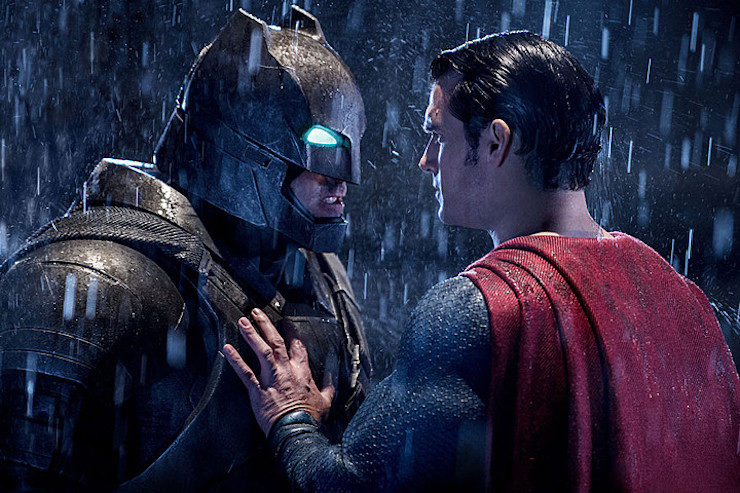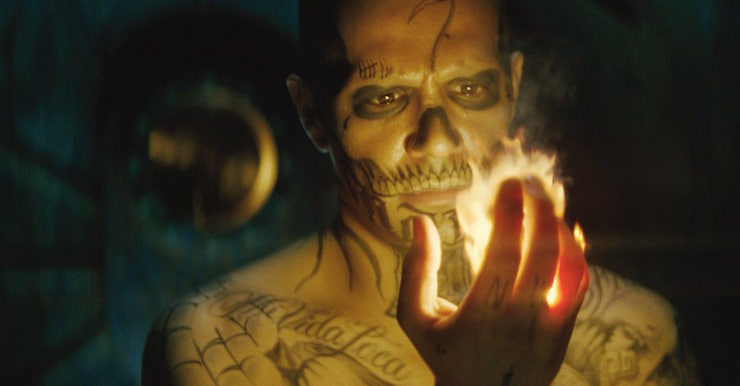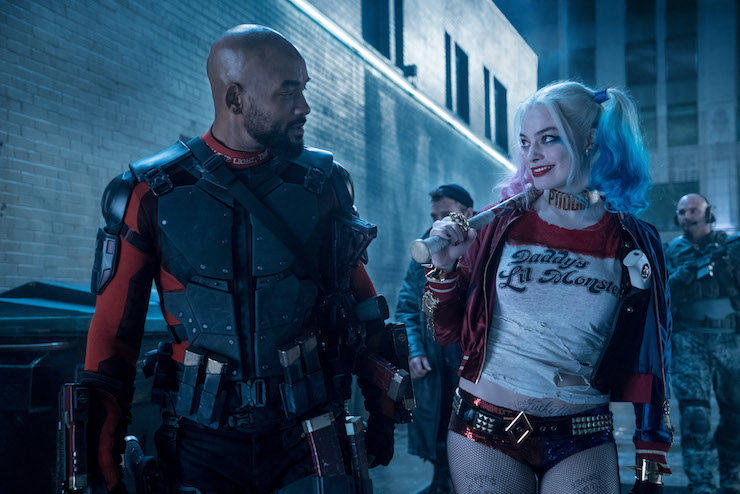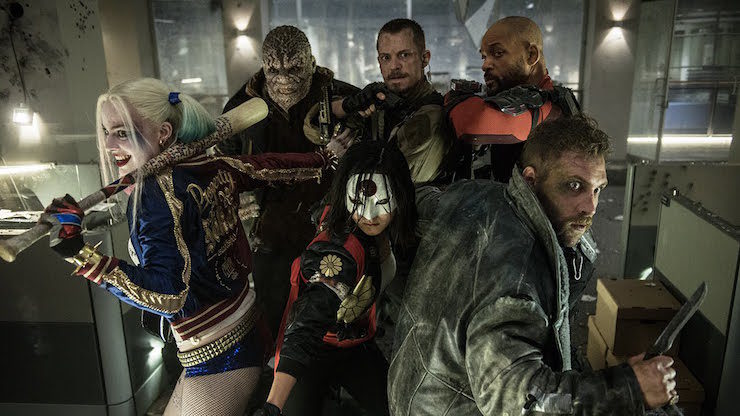If you haven’t seen Suicide Squad yet, you should consider going. It’s the most interesting failure you’ll see this year: two tonally unique cuts of the same movie Frankensteined together by a studio that seems, these days, to panic at the first sign of trouble.
It’s especially weird because both cuts share the same issues and the same strengths. The female characters, Amanda Waller aside, are thinly written to the point of invisibility and/or offensiveness—Katana, in particular, is absolutely wasted. The second act twist, however, works really well, and the moral grey areas the movie lives in come across very strongly throughout. The film veers wildly from intensely grim superhero/soldier noir to bloody-knuckled glee and back again, but way more of it works than you might have been led to believe. The standouts—Will Smith, Viola Davis, and Joel Kinnaman—are all in top form, but the entire cast is ludicrously strong. Watch out in particular for Jay Hernandez, unrecognizable under El Diablo’s full skull tattoos. He turns in the quietest, best work in the movie.
Suicide Squad is not even a little tonally coherent and is tediously reductive in a number of ways, but the really interesting thing about the movie isn’t what it does, but what it says. Not only is it the first legitimately FUN movie the DC Extended Universe has given us so far, but it’s also the first to clearly communicate the DCEU’s central conceit…
Namely, that metahumans are the worst thing to ever happen to humanity. And vice versa.
That fundamentally negative approach is incorporated throughout all three DC movies to date. It first becomes clear in the infamous third act of Man of Steel, with the arrival of General Zod’s forces. The impact, both psychological and physical, on Earth is colossal as we’re confronted with absolute proof of alien life—and at the same time, drives home the sense of just how lucky we were that Superman was raised by human parents. In fact, the entire movie can be read as Clark Kent choosing his adoptive world, and its values, over the gloriously eternal and ultimately meaningless battle of Zod’s Kryptonian zealots.

That becomes even more apparent in Batman v Superman. Not only does the destruction at the end of Man of Steel serve as the sequel’s inciting incident, but there’s also some interesting work done in terms of exploring the human consequences of Superman’s existence. Bruce Wayne’s stance—if there’s even the slightest chance Superman can’t be trusted, then he’s a threat—is based in Bruce’s first-hand experience of terror, but it also has one foot in demonstrable fact. This is a being who, as presented onscreen, was complicit in the destruction of a couple of square miles of Metropolis and colossal loss of life. Superman may be a force for good everywhere else, but all he needs is one bad day to cause massive damage. And Bruce, through Lex Luthor’s machinations, ends up assisting in the creation of that bad day.
That fundamental fear of the other, of the new, is something that’s present throughout BvS. The first time we see it is Lex’s obsession with the alien technology and the clear Faustus/Pandora’s Box metaphor that comes along with it. There are huge, unknowable things out there and as the movie finishes, it seems pretty clear that they’ve noticed us and we’re not ready. That’s not just negative—that’s practically Lovecraftian.

It’s also why Bruce and Diana begin assembling the Justice League, and the fact that they have to go digging for their fellow heroes only reinforces this fundamentally dark worldview. As the footage screened at SDCC shows, Barry Allen/The Flash is operating undercover and seemingly off the grid while Arthur Curry/Aquaman is overtly hostile to the surface world. Vic Stone/Cyborg is arguably in the worst spot after surviving a horrific accident only by having his body merged with alien technology. None of these people wanted their powers, none of them want the limelight, and none of them are going to be able to avoid it. Of course, judging by that SDCC footage, Ezra Miller’s charmingly puppyish take on Barry Allen may run headlong into the spotlight, but he’s the exception to the rule.
Speaking of exceptions, the decision to position Wonder Woman up as the team veteran is arguably the most interesting thing the DC movies have done so far. BvS makes it clear that Diana Prince retired from the world after being disgusted by what she witnessed during the First World War, and the trailer for her own movie certainly bears that out. Again, there’s the negativity, albeit from the other side: the story of a metahuman making her way out into the world and finding that neither it, nor she, are ready.

That brings us to Suicide Squad, and a group of people powered not by altruism, but by guilt and self-loathing. El Diablo’s horror at his own powers, Doctor Moone’s terror at letting the Enchantress out, Deadshot’s hatred of Batman for arresting him in front of his daughter—all are examples of people with exceptional skills being punished for making use of them. Time and again, the movie confronts its characters with both what they can do and the consequences of what they’ve done. At its best, it gives them an opportunity to short circuit expectations and use those skills for good. Most intriguingly, much of the movie involves Harley Quinn realizing that being treated like an equal is more interesting than being placed on a blood-soaked pedestal. The entire film is about people’s better natures winning out over the expectations placed on them. When that works, the film soars. When that concept fails—as it does, dismally, several times—it drags the entire movie down with it.
In spite of these failures, this approach is still the most direct expression of what seems to be the grounding principle of the DC Movie universe. It’s a brave principle, too—one that definitely sets the universe on different tonal ground when compared to the Marvel movies. There, every hero’s origin (from what we’ve seen to date) is fundamentally positive, generally altruistic, and in most cases, welcome. Steve Rogers volunteers to become Captain America, Tony Stark designs a suit to save his life, Sam Wilson returns to his old para-rescue rig to become Falcon, Black Widow seizes the opportunity to start working off some of the red in her ledger, and so on. It’s particularly interesting that the two Avengers who clearly have grimmer, more potentially problematic backgrounds, Black Widow and Hawkeye, are the two whose backstories (farm notwithstanding) remain relatively unexplored.
It’s also interesting to note how the large events in the MCU have slowly become darker as the films progress. The battle in Age of Ultron leads to the Sokovia Accords, which in turn lead to the fragmentation of the Avengers Initiative and the (hopefully temporary) dissolution of Tony and Pepper’s relationship in Civil War. Nothing in the Marvel universe comes without a price, but even those prices tend to be worth paying in the long run.

Meanwhile, over in the DC universe, Deadshot simply getting to say goodbye to his daughter before his chains are put on counts as a win. At least so far.
That’s my big takeaway from Suicide Squad: that the DC movie universe is still very young and very clearly finding its feet. The folks at Marvel Studios are thirteen movies in and are starting to explore the edges of their fundamentally positive approach to the subject matter. DC are three movies in and just starting to articulate what their films are trying to say. They’re getting there, too, and there’s some amazing ground to cover and stories to tell if they have the courage of their convictions. At least one of the two cuts of Suicide Squad seemingly did, from what we saw in the final version. Here’s hoping that Wonder Woman and the movies that follow get a chance to shine where, in spite of how much fun it is, Suicide Squad did not.
Alasdair Stuart is a freelancer writer, RPG writer and podcaster. He owns Escape Artists, who publish the short fiction podcasts Escape Pod, Pseudopod, Podcastle, Cast of Wonders, and the magazine Mothership Zeta. He blogs enthusiastically about pop culture, cooking and exercise at Alasdairstuart.com, and tweets @AlasdairStuart.










